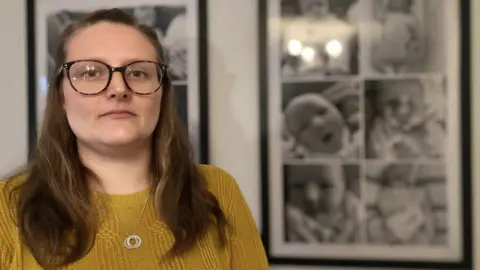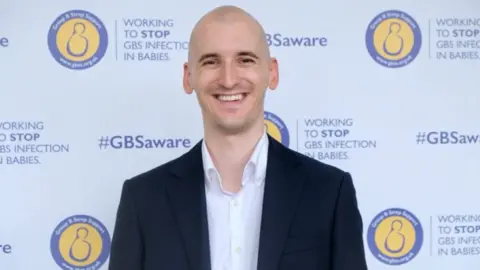Table of Contents
By Rachael McMenemy & Alex DunlopBBC News, Suffolk

 Alex Dunlop/BBC
Alex Dunlop/BBCMothers of babies who died or suffered brain damage from a Group B Strep (GBS) infection say routine screening is needed.
Two mothers from Suffolk have also backed a campaign to have the infection put on the notifiable disease list.
The charity Group B Strep Support has said that GBS was the most common cause of life-threatening infections in newborns.
Screening has not been recommended by the UK National Screening Committee.
The Department of Health and Social Care (DHSC) said it has considered making changes to the list following a consultation last year.
NHS guidance stated GBS was common in pregnant women and rarely caused any problems. It can be passed onto babies during labour.
‘Should be offered to everyone’

 Alex Dunlop/BBC
Alex Dunlop/BBCNatalie Lockyer’s daughter Quinn died aged 10 weeks after developing GBS at five weeks old.
Ms Lockyer, 32, from near Haverhill, Suffolk, said Quinn’s birth was «perfect» and she had no issues during labour.
However, five weeks later she developed «huffy» breathing and in the days following was diagnosed with GBS after deteriorating in hospital.
She was transferred to Great Ormond Street Hospital in London, where Ms Lockyer said medics from around the world expressed their shock that GBS screening was not routine procedure in the UK, as it was in other countries.
«If they do it, why don’t we? It’s so simple,» she said.
She said: «We’ll never know where she got it from because she developed it later. It probably was from me during labour.
«This should not be something charities and mums who have lost or got babies in really difficult circumstances because of the disease, have to push for, it should be something the NHS offers to everyone,» Ms Lockyer added.
‘Albie could have been saved’

 Alex Dunlop/BBC
Alex Dunlop/BBCRob Salmon and Becca Murcott’s son Albie was born on Boxing Day 2023 and had Group B Strep Meningitis, which has caused a brain injury.
He became ill at home and was admitted to hospital where his condition stabilised.
His parents, from Cockfield, Suffolk, said they had never heard of the condition prior to their son’s diagnosis.
Ms Murcott said: «Potentially he’ll be severely disabled through his brain injury, but there’s also a chance he could still pass away, especially if he got an infection.»
«If I’d been tested before giving birth to him, I would have been given antibiotics and he would have been fine,» she said.
Mr Salmon said: «We could have been tested and prepared for it and Albie could have been saved from it.»
Ms Murcott said testing should be carried out in labour or shortly before.
‘Postcode lottery’

 Oliver Plumb
Oliver PlumbOliver Plumb, from the charity Group B Strep Support, said it was a «small number of babies» exposed to the bacteria that developed a serious and potentially fatal infection.
He said around 800 babies a year developed the infection – which is about two babies a day – and about one a week will die, while another a week will be left with a lifelong disability.
«It’s a heart-breaking start to life for families and that often the first they hear of Group B Strep is when their baby is sick or in intensive care».
The charity has called for GBS to be a notifiable disease to make it a legal responsibility for infections to be reported. It added that current figures could be «missing around one fifth of the infections».
There was a «postcode lottery» in terms of how many families will hear about GBS, he said. The charity also backed calls for screening.
«In the UK we don’t sadly have a routine testing programme, that’s at odds with much of the rest of the high-income world. «
A DHSC spokesperson said a public consultation on the notifiable diseases list was carried out last year.
«DHSC and UKHSA are considering the responses and confirmation of any changes will be published in due course,» they said.
Several reasons for not recommending routine screening have been given by the committee, including that results can change in the last few weeks of labour, and that GBS does not cause infection in every baby.
The decision is due to be reviewed following an ongoing screening trial.
However, the charities Group B Strep Support, Bliss, The UK Sepsis Trust, Meningitis Research Foundation, Meningitis Now and The Lullaby Trust have written to the DHSC to ask for the infection to be added to the government list.
Any occurrence of a listed disease must be reported to allow outbreaks and spread to be monitored.

Follow East of England news on Facebook, Instagram and X. Got a story? Email eastofenglandnews@bbc.co.uk or WhatsApp us on 0800 169 1830

